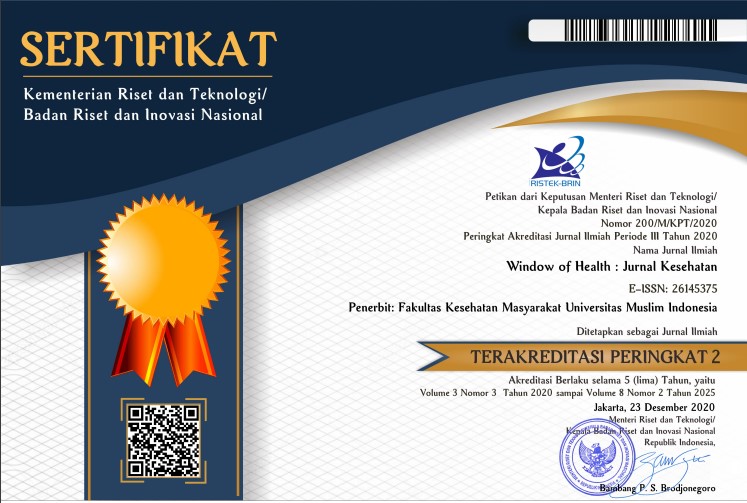In Silico of AMHRII Receptor Binding and Toxicity Prediction of Clitoria ternatea
Abstract
Clitoria ternatea compounds show significant potential as herbal drug candidates for polycystic ovary syndrome (PCOS) through improving anti-Müllerian hormone (AMH) parameters. This study aims to evaluate the potential of these compounds in binding to AMHRII receptors using an in silico approach. Several compounds, baicalein, isorhamnetin, and malvidin, showed high binding affinity towards AMHRII receptors, approaching or even surpassing some control drugs. These compounds have favorable toxicity profiles, with high LD50s, suggesting low toxicity and high safety potential for therapeutic use. Some compounds, such as isorhamnetin, termination, petunidin, malvidin, cyanidin, luteolin, and protocatechuic acid, have an unfavorable number of hydrogen donors, as does gallic acid, which has an unfavorable number of hydrogen acceptors. The development of technologies that improve bioavailability and pharmacokinetics can overcome these challenges. Further studies in vivo are needed to confirm the effectiveness and safety of these compounds in potential clinical therapies and develop innovative herbal therapies for Clitoria ternatea-based PCOS.
References
Eriyono Budi Wijoyo K, Ardiani L, Irawati P, Selatan S. Obesity Incidence with Body Image in Female Adolencence. Window of Health : Jurnal Kesehatan. 2024;4(2):168-175. doi:10.33096/WOH.VI.736
Ashkar F, Rezaei S, Salahshoornezhad S, Vahid F, Gholamalizadeh M, Dahka SM, et al. The Role of medicinal herbs in treatment of insulin resistance in patients with Polycystic Ovary Syndrome: A literature review. Biomol Concepts. 2020;11(1):57-75. doi:10.1515/BMC-2020-0005
Yuliana K, Ananti Y, Fitri Agustina I, Selatan S. Effectiveness Of Clittoria Ternatea And Zingibers Officinale Concoction On The Reduction Of Dysmenorrhea In Adolescent Girls. Window of Health : Jurnal Kesehatan. 2024;07(02):148-158. doi:10.33096/WOH.VI.920
Kurniawati EY, Pramono N, Hidayat S, Mahati E. Clitoria Ternatea as a Potential Herb in Polycistic Ovary Syndrome. International Journal of Medicinal Plants and Natural Products (IJMPNP). 2024;10(1):2454-7999. doi:10.20431/2454-7999.1001001
Kurniawati EY, Pramono N, Hidayat ST, Makati E. Effect of Clitoria ternatea on follicle stimulating hormone receptor: molecular docking study. Berkala Penelitian Hayati. 2024;30(1):29-34.
Wiweko B, Maidarti M, Priangga MD, Shafira N, Fernando D, Sumapraja K, et al. Anti-mullerian hormone as a diagnostic and prognostic tool for PCOS patients. J Assist Reprod Genet. 2014;31(10):1311-1316. doi:10.1007/s10815-014-0300-6
Bhattacharya K, Saha I, Sen D, Bose C, Chaudhuri GR, Dutta S, et al. Role of anti-Mullerian hormone in polycystic ovary syndrome. Middle East Fertil Soc J. 2022;27(1). doi:10.1186/s43043-022-00123-5
Yovi Kurniawati E, Pramono N, Thaufik Hidayat S, Mahati E. In Silico Pharmacokinetic and Toxicity Analysis on Clitoria Ternatea Flower. Jurnal Farmasi Indonesia. 2023;20(2):124-135. doi:10.31001/jfi. v20i1.paperID
Adisakwattana S, Ruengsamran T, Kampa P, Sompong W. In vitro inhibitory effects of plant-based foods and their combinations on intestinal α-glucosidase and pancreatic α-amylase. BMC Complement Altern Med. 2012;12. doi:10.1186/1472-6882-12-110
Muhammad Ezzudin R, Rabeta MS. A potential of telang tree (Clitoria ternatea) in human health. Food Res. 2018;2(5):415-420. doi:10.26656/fr.2017.2(5).073
Fan J, Fu A, Zhang L. Progress in molecular docking. Quantitative Biology. 2019;7(2):83-89. doi:10.1007/S40484-019-0172-Y/METRICS
Agarwal S, Mehrotra R. An overview of Molecular Docking. JSM Chem. 2016;4(2):1024. https://www.researchgate.net/publication/303897563. Accessed July 7, 2024
Fu H, Lin Y, Deng X, Wu L. Correlation between anti-Mullerian hormone levels and antral follicle counts in polycystic ovary and metabolic syndromes. Syst Biol Reprod Med. 2021;67(2):112-120. doi:10.1080/19396368.2020.1860155
Dewailly D, Robin G, Peigne M, Decanter C, Pigny P, Catteau-Jonard S. Interactions between androgens, FSH, anti-mullerian hormone and estradiol during folliculogenesis in the human normal and polycystic ovary. Médecine de la Reproduction. 2019;21(2):145-163. doi:10.1684/MTE.2019.0744
Copyright (c) 2024 Erna Yovi Kurniawati, Endang Mahati, Zaw Myo Hein

This work is licensed under a Creative Commons Attribution-NonCommercial-ShareAlike 4.0 International License.








